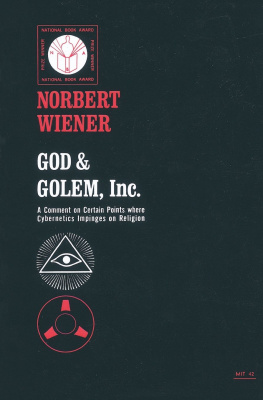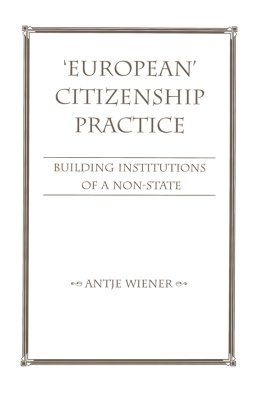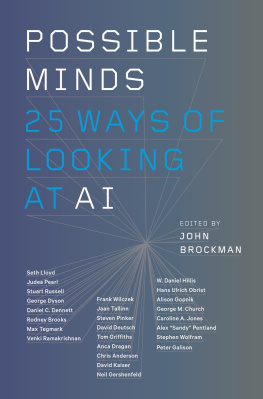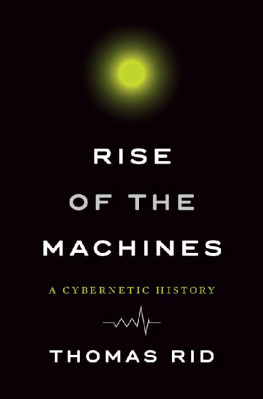Norbert Wiener
GOD AND GOLEM, Inc.
A Comment on Certain Points where Cybernetics Impinges on Religion
THE M.I.T. PRESS
Massachusetts Institute of Technology
Cambridge, Massachusetts
Transcribed, edited and corrected by bervison, december 2019. Absolutely no rights reserved.
Preface
Some years ago, in The Human Use of Human Beings, the study of control and communication in machines and living beings. At that period, cybernetics was a relatively new idea, and neither the scientific nor the social implications had become fully clear. Nowsome fifteen years latercybernetics has made a certain social and scientific impact, and enough has happened to justify a new book in a related field.
The problem of unemployment arising from automatization is no longer conjectural, but has become a very vital difficulty of modern society. The cybernetic circle of ideas, from being a program for the future and a pious hope, is now a working technique in engineering, in biology, in medicine, and in sociology, and has undergone a great internal development.
I have given more than one series of lectures trying to outline the impingement of this circle of ideas on society, ethics, and religion, and I think the time has come to attempt a synthesis of my' ideas in this direction, to consider more in detail the social consequences of cybernetics. This book is devoted to certain aspects of these consequences, in the discussion of which, although I retain the ideas and many of the comments which I made in the Human Use of Human Beings, I can consider the matter more in detail and more completely.
In this undertaking, I wish to acknowledge the great help I have received from the criticism of many friends on both sides of the Atlantic, especially from Mr. Piet Hein of Rungsted Kyst in Denmark, from Dr. Lawrence Frank of Belmont, Massachusetts, and from Professor Karl Deutsch of Yale University, as well as from many others. In addition, I wish to thank my secretary, Mrs. Eva-Maria Ritter, for her assistance in the preparation of this material.
I found an opportunity to elaborate my ideas in a course of lectures which I gave in January of 1962 at Yale University, and in a seminar that was held in the summer of 1962 at the Colloques Philosophiques Internationaux de Royaumont near Paris, However, this book, though containing material from my talks at both these places, has been completely rewritten and reorganized.
With gratitude to the many who have helped in this effort.
Norbert Wiener
Sandwich, New Hampshire
August 30, 1963
I
It is here my intention to discuss not religion and science as a whole but certain points in those sciences in which I have been interestedthe communication and control scienceswhich seem to me to be near that frontier on which science impinges upon religion. I wish to avoid those logical paradoxes that are bound to accompany the extreme (but usual) claims of religion to deal with absolutes. If we are to treat knowledge only in terms of Omniscience, power only in terms of Omnipotence, worship only in terms of the One Godhead, we shall find ourselves entangled in metaphysical subtleties before we shall have really embarked upon our study of the relations between religion and science.
Nevertheless, there are many questions concerning knowledge, power, and worship which do impinge upon some of the more recent developments of science, and which we may well discuss without entering upon these absolute notions, which are surrounded with so much emotion and reverence that it is quite impossible to enter upon them in a detached way. Knowledge is a fact, power is a fact, worship is a fact, and these facts are subject to human investigation quite apart from an accepted theology. As facts, these matters are subject to study, and in this study we may adduce our observations of knowledge, power, and worship in other fields, more accessible to the methods of the natural sciences, without at once demanding of the student a complete acceptance of the "credo quia incredible est" attitude.
It may be said that by starting in this way outside religion, I have already removed this discussion from being one of the relations between science and religion, which is suggested by the general trend of this essay. Therefore, I had better define my theme at the beginning, specify the corner of my subject in which I intend to remain, and disclaim those purposes that are alien to my specific task. As I have said, I have been working for several years on problems of communication and control, whether in machines or in living organisms; on the new engineering and physiological techniques attaching to these notions; and on the study of the consequences of these techniques for the achievement of human purposes. Knowledge is inextricably intertwined with communication, power with control, and the evaluation of human purposes with ethics and the whole normative side of religion. I t is hence germane to a revised study of the relations between science and religion that we should re-examine our ideas of these matters in terms of the latest developments of theory and practical technique. This may not itself constitute a study of science and its relations to religion in the full sense, but it certainly constitutes an indispensable prolegomenon to such a study.
In a study of this sort, if it is to lead anywhere, we must disencumber ourselves of the superimposed layers of prejudice that we use nominally to protect the homage which we pay dignified and holy things but in fact, as often as not to relieve ourselves from the sense of unworthiness which we feel in looking unpleasant realities and dangerous comparisons in the face.
If this essay is to mean anything, it must be a real probing of real questions. The spirit in which it is to be undertaken is that of the operating room, not of the ceremonial feast of weeping about a corpse. Squeamishness is out of place hereit is even a blasphemy, like the bedside manners of the fashionable physician of the last century, with his black frock coat and the surgical needles hiding under the silk lapel of his coat.
Religion, whatever else it contains, has often something in itself of the closed front parlor of a New England farmhouse, with drawn blinds, wax flowers under a bell jar on the mantelpiece, gilded bulrushes surrounding grandfather's portrait on an easel, and a harmonium in black walnut, never played except at weddings or funerals. Or again, it is the moral counterpart of a Neapolitan hearse, one of those black plate-glass-windowed royal carriages, with their black-plumed stallions carrying even into death the assertion of status, or at any rate of the aspiration to status. Religion is a serious matter that we must separate sharply from any consideration of personal values of less significance than religion itself.
I have spoken of the layers of prejudice which encumber our approach to those problems in the vital common ground where science and religion come together: we must avoid discussing God and man in the same breaththat is blasphemy. Like Descartes, we must maintain the dignity of Man by treating him on a basis entirely different from that on which we treat the lower animals. Evolution and the origin of species are a desecration of human values; and as the earlier Darwinians found, to entertain these ideas is very dangerous for the scientist in a world fundamentally suspicious of science.
But even in the field of science, it is perilous to run counter to the accepted tables of precedence. On no account is it permissible to mention living beings and machines in the same breath. Living beings are living beings in all their parts; while machines are made of metals and other unorganized substances, with no fine structure relevant to their purposive or quasi-purposive function. Physicsor so it is generally supposedtakes no account of purpose; and the emergence of life is something totally new.
Next page








